From Reshat Kripa
Part One
Memorie.al / To talk about the communist genocide carried out in prisons and camps is like describing the horrors of hell. Ask those who managed to escape these horrors alive and you will learn things never heard before, inconceivable for a sane mind. You will learn about prisons and camps created specifically for the extermination of people, about horrific tortures inflicted upon prominent nationalists and democratic intellectuals who dedicated their lives to their homeland.
Ask the survivors of these tortures and you will learn about whippings to death, about the provocation of open wounds and the pouring of salt on them, about burns with lit cigarettes, about electric current and wearing a “strength vest,” about being left for entire days without food and water, about the rape of family members in front of their eyes, about being hung upside down, about placing freshly boiled eggs under armpits, about inserting needles under fingernails, and dozens upon dozens of other forms of torture.
The criminals competed to see who could surpass their peers in their savagery, who would cause more victims. A true competition of cannibals who were not satiated by the blood of their fellow citizens. The communist regime also carried out an extraordinary genocide against the religious clergy in Albania, and this at a time when the positive role of this clergy in our country was well known and when the harmony between them was at the highest level.
Long before communism took root in Albania, the first warning was given in the most alarming way by the late scholar, patriot, and anti-communist, Hafiz Ali Korça, back in 1925 with the book he published at the time, “Bolshevism or the Destruction of Humanity.” Among other things, in this book he observes:
“Bolshevism never
reconciles with the faith of Muhammad
The gates will have war
on the Day of Judgment.”
The elimination of religion was essential for the injection of communist dogma and, consequently, for the creation of the “new man.” However, the communists knew that for the overwhelming majority of the population, religion held a very important place, thus hindering their further development in the field of the party’s materialistic worldview on the phenomena of nature and society.
Religion was presented everywhere as a hindrance to the pace of civilization and social emancipation, and therefore, according to the communist leaders; the only path to social progress was liberation from its dogma. In service of this idea, dozens of propaganda books were published, where religion was described as: “a very heavy burden for humanity and a suitable weapon in the hands of the ruling exploitative classes to keep believing workers in darkness, obedient, and commanded.”
Such statements are nothing more than vulgarizations of the Marxist invitation to examine the links between religion and models of domination and exploitation. Marx rejected the Hebrew traditions of his family and argued that the great desire for a happy life in the afterlife could be considered part of an ideology that prevented workers from striving in this world for a just and non-exploitative social order. Therefore, religion, according to him, was “the opium of the people,” in other words, a group of dogmas that hid the realities of class struggle and exploitation.
In communist Albania, as in all totalitarian states, the control over the production of knowledge was a vital part of the control of society in general. Therefore, in parallel with propaganda, the communist state took care to eliminate every form of art and thought that could be an obstacle on the path started for brainwashing and the creation of a literature that would be marked by a characteristic inability to overcome banality. This project was based on concrete initiatives.
Thus, less than two weeks after the partisans entered Shkodër, in early December 1944, the publication of the periodicals “Hylli i Dritës,” “Zani i Shën Ndout,” “Zgjimi i djelmënisë,” and “Bijat e Zojës” was banned. In this spirit, three years later, on March 2, 1948, the Tirana District Court banned the circulation of over 155 titles, which, according to the court, “have harmful ideological content for our people and are against the new democratic spirit and consequently their circulation does not bring any benefit to our people, but on the contrary disorients and incites them to hatred and division.”
Two years later, the Presidium of the People’s Assembly issued decision no. 1150, dated 27.2.1950, for the blocking of all books published or entered Albania before November 29, 1944. An unprecedented persecution of the most prominent members of the clergy began. In the inventory of their persecution, there is no lack of steadfastness; in fact, it often adapts to the dimensions and harshness of the persecution. It must be kept in mind that everything was happening in an atmosphere of complete material ruin, fear, and despair.
After the violent state interventions in the organization of the life of the Albanian Muslim Community, the seizure of properties, control over the budget, the banning of literature, the strict limitation and control over the Madrasa, communist politics strengthened a harsh “unmasking” propaganda, through the press, radio, forms of education, cinema, theater and variety shows, parts of school readings, and education with contempt for religion.
Even greater pressure was experienced by the teachers of the Madrasa, starting in 1945, with the arrest of Hafiz Ali Korça, the director Hafiz Ismet Dibra in 1946, Enver Beqiri in 1946, Vexhi Buhara in 1947, Jonuz Buliqi in 1947, Shaban Demiri in 1946, etc. Muslim clerics, including the Bektashis, experienced shocking events during the communist regime. For many of the most influential leaders and scholars, the State Security placed spies, brought out false witnesses in fabricated trials, shot, condemned, and interned them, sowing a general atmosphere of terror.
The Muslim clergy was persecuted in many different forms and by different means by the new atheists who came from the mountains and controlled everything that constituted the sacred life and rituals of the believers. At first, the communists tried to entice the Muslim clerics, to win them over to their bloody adventure against a part of the Albanians, but when they failed, they began the calvary of persecution. As always, in their style, the communists focused the strike on the heads of the Muslim religious elite.
According to statistics, during the first ten years of the dictatorship alone, 60 Hafiz and Hoxhas were shot and convicted, along with 83 dervishes and Babas. These dozens shot and hundreds interned from this faith join the first martyrs of freedom and faith at the harshest peak of the communist dictatorship. Some of the most representative public figures of Albanian Muslims were executed by communist courts, amid a popular hysteria in the courtroom and outside, conveying the banal accusations and slanders with a megaphone and radio broadcast, to sow terror throughout the Muslim Community.
Such were the trials of 1947, when Sheh Qerimi of Delvina, Shehu of Devolli, the deputy Sheh Ibrahim Karbunara, along with his son Hasan, were sentenced to death on the standard charge of “enemy of the people.” Muslim clerics no less than the clerics of the Christian faiths became sacrifices for their faith, faithful until the end of their lives, to the believers they represented. They did not accept any compromise with the regime, they remained faithful to their religion, to the homeland and the nation, for which their spirit remained open and free.
The persecution of religion took place in several phases. The first phase of persecution is clearly seen in the years 1945-1966, with imprisonment and executions, after horrific tortures in the State Security organs. Against this background, an unusual episode for the lives of religious communities takes place.
Found under pressure from two of the most influential Babas of the Bektashi community, Baba Faja Martaneshi and Baba Fejzo Dervishi, who demanded the “democratization” of the Bektashi tariqa, a “democratization” that would lead the dervishes to wear civilian clothes and marry, in March 1947, the Bektashi World Grandfather, Dede Abaz Hilmiu, found no other solution but to kill both of them. After this act, he turned the pistol and killed himself. A gesture of rare nobility.
The second phase, 1966-1990, is the longest and darkest for religion in Albania. As a result of the so-called “Open Letter” of Enver Hoxha, and the “Cultural Revolution,” a true genocide against religious institutions began. In 1967, supposedly on the initiative of the youth of the “Naim Frashëri” High School in Durrës, a “new era” of radical changes began, and the fight against foreign and religious manifestations took on another dimension. The meaningful initiative of the communist youth organization of the “Naim Frashëri” school was followed by the students of the “29 Nëntori” school, and then the entire working class of the Durrës district took action. In the letter addressed to the party and government institutions of the time, the youth organization of the “Naim Frashëri” High School demanded that: “the time had come for priests and hoxhas to earn their own bread.”
Thus began a true genocide against religious institutions. Indoctrinated mobs stormed churches, mosques, and teqes, destroying them and bringing about their total ruin. In Albania, you no longer saw priests, hoxhas, or dervishes, dressed in their characteristic uniforms. On the contrary, prison awaited you. It was also not dared to have religious conversations or discussions. The total expropriation of the properties of religious communities was implemented.
But the biggest scandal was the hiding of weapons in the Franciscan church in Shkodër. Here is how Father Leon Kabashi testifies about this event: “It was an ugly act that cost us a lot! It seems the order had come from Tirana.
The State Security workers of Shkodër entered through the courtyard of the Franciscan gymnasium, connected with a student (Xhakua) and the assistant cook, to whom they had apparently told beforehand that the clergy was finished, while you would be rewarded. Father Aleks Baqli, who had seen the suspicious movements, stayed up all night under surveillance (in the sacristy) and was able to see the entrances and exits of that night in the church, but since it was quite far away and dark, he could not exactly distinguish what was being done there.”
In a secret order from the dictator Enver Hoxha in 1967, figures and details are given for the destruction of places of worship in Albania and the open war against religious faiths. This number reaches a total of 2169, of which 740 mosques, 608 Orthodox churches and monasteries, 157 Catholic churches, 530 teqes, türbes, mekams, and others. In this order from the dictator, sent as a secret document to the Central Committee in August 1967, a detailed report on the results of the war against religion is given. Here is what is said in some of its lines:
“Religion is the opium of the people. We must do everything we can to make every person understand this… This is not an easy job, but it is not impossible either. This great war should not be left to spontaneity, and we should not be content with saying that the new generations will abandon this opium; we must direct our war against religion itself, against its philosophical, idealistic, and mystical views, as well as against the religious disciplines that have entered even into the daily customs of those who believe, and even those who do not, but who sometimes apply them without knowing, without paying attention.
We have not left them any school, not even a lower one, to produce new clerics and to give them a regular and interpreted education of their religious doctrine. So the clerics of every faith have run out and will run out even more as cadres. As for the printing of their books, of their dogmas, this has long since died for them…!
So, we have eliminated the material and propaganda basis for the multiplication of religious books. We have also eliminated the possibility of producing cadres. Now the issue is to destroy their churches and mosques, the only main means where the clerics gather believers to keep the faith alive, even in decadent forms…!
We must continue in these forms, until we level them from the face of our land. The war with religion is quite complicated, so whoever is not well armed against it may not have the results we desire. Many churches and mosques are being abandoned and are being ruined. No construction should be done on them. Some can be turned into museum works, if they are such, some that the people want can be made into warehouses, they should not hesitate to be taken, and so on…”.
But the resistance of the Albanian clerics to the communist genocide was extremely dignified. Here is how some of them expressed themselves at special moments in their lives:
Father Mëshkalla
In a letter addressed to Prime Minister Mehmet Shehu on May 1, 1967, he stated: “I cannot change the course of my life, but I will continue as long as I have breath. The external obstacle of major force will only have the effect on me that a stone or dirt has when it blocks the flow of water: The people know me and know well how I have dedicated my life to them. I say that with this war against religion, we are also discrediting ourselves in the face of the world, to which we have given solemn promises for human freedoms and rights in Albania.
When, in 1945, in Tirana, on March 8, I met you, Excellency, because I had heard from the communists the words: ‘We will turn this Church into a cinema’! You answered me: ‘This is hostile propaganda’! Truly, not even the most rabid enemy of the government has been able to do more hostile propaganda in 22 years than you have done to yourselves. It was not hatred, ambition, or interest that led me to write to you, Excellency, but only conscience, truth, and goodness.”
Father Anton Harapi
On September 13, 1943, he was appointed a member of the Regency Council, where he remained until the end of 1944. Father Anton Harapi, in his speech on the occasion of his oath as a member of the High Council, would express himself as follows: “I believe that there is no Albanian who thinks that I took this burden for a comfortable seat, for interest, or for some intrigue. Someone might just be afraid that it was some obsession of mine that pushed me to this point.
And I confirm your word and I say yes: the obsession with Albania, yes, that was what gave me the dilemma: either with anarchists to shed blood, or to abandon the national question. And since my soul did not tell me to do either one or the other, I was forced to choose one of two: either to do a foolish thing by accepting this office, or to show a weakness by leaving. I decided it was better to do a foolish thing: or as those Albanians who want to remain pure say—I wanted to be compromised.”
Hafiz Ali Kraja
This is how he had made the balance of his troubled life, in his “Notes,” with a concise and short “credo”: “First, I give an account to the blessed God, His judgment is the most important!” and: “I am proud that I have tried to fulfill my religious and national mission as much as I could. I ask God to forgive me for the shortcomings I may have had in fulfilling this mission.”/ Memorie.al




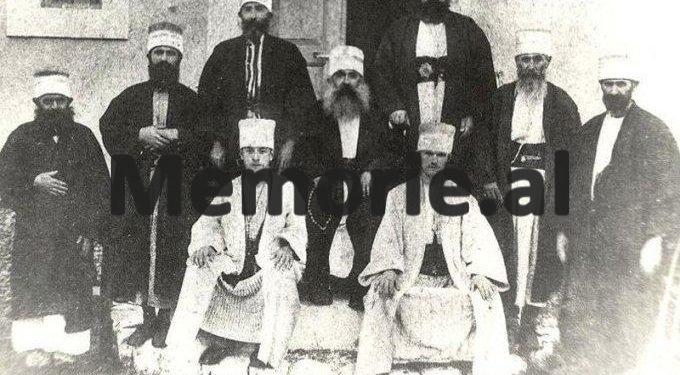
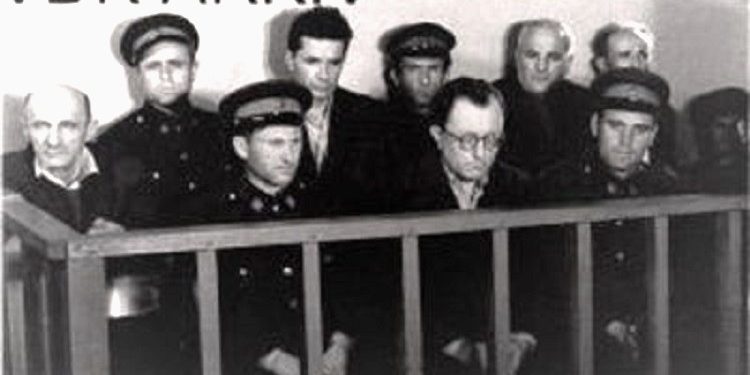
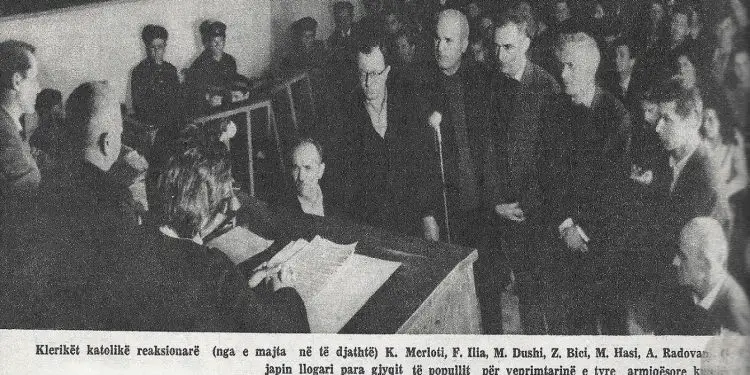
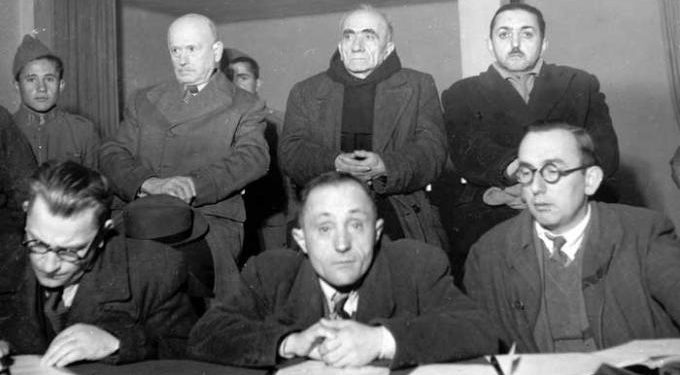
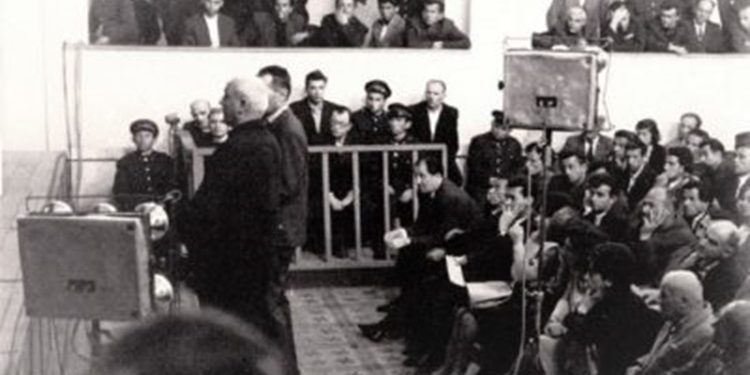

![“The ensemble, led by saxophonist M. Murthi, violinist M. Tare, [with] S. Reka on accordion and piano, [and] saxophonist S. Selmani, were…”/ The unknown history of the “Dajti” orchestra during the communist regime.](https://memorie.al/wp-content/uploads/2026/02/admin-ajax-3-350x250.jpg)
![“In an attempt to rescue one another, 10 workers were poisoned, but besides the brigadier, [another] 6 also died…”/ The secret document of June 11, 1979, is revealed, regarding the deaths of 6 employees at the Metallurgy Plant.](https://memorie.al/wp-content/uploads/2026/02/maxresdefault-350x250.jpg)




